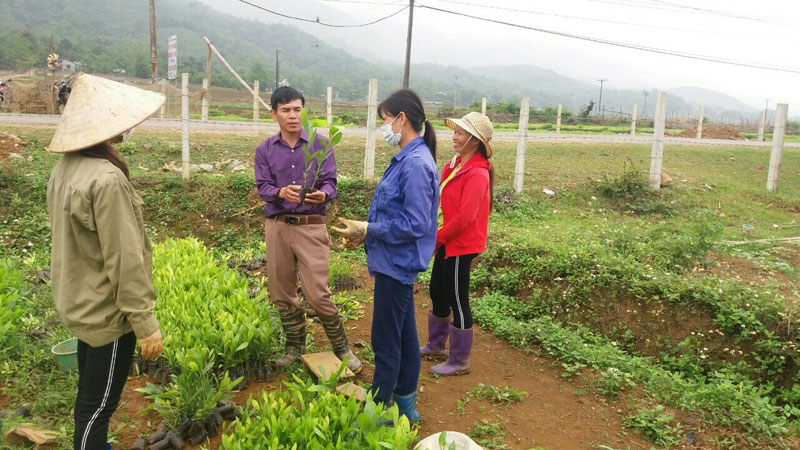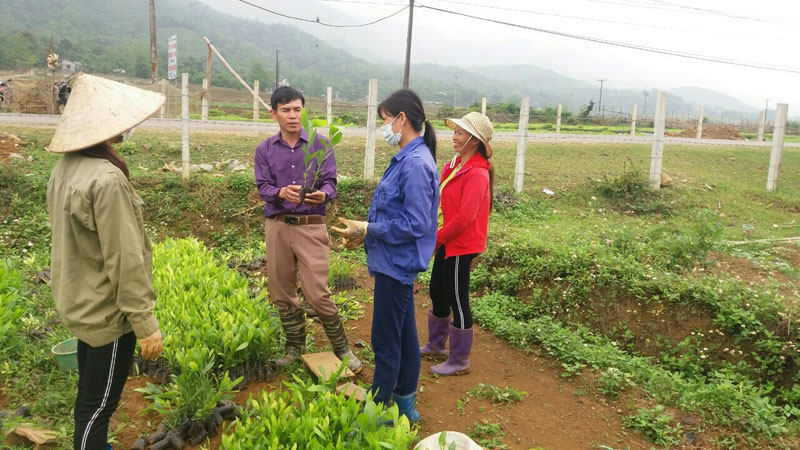
(HBO) – In recent years, the local people in Kim Boi district have concentrated on economic developments towards forest production. Forest economic development brings realistic benefits for economy-society, protects watershed forests, protects environment, increases forest cover and creates jobs, ensures stable income and contributes to hunger eradication and poverty reduction for the local people.
The nursery of Mr. Quach Van Canh’s family at
Ma hamlet, Cuoi Ha commune, providing the acacia seedlings has become a
familiar address for many farmers inside and outside the commune.

Mr. Quach Van Canh at Ma hamlet, Cuoi Ha
commune (Kim Boi district) tested the quality of acacia seedlings before
exporting.
Before implementing the nursery model, Mr.
Canh’s family mainly cultivated rice and corns but their productivity and
economic efficiency were very low. It was realized that the movements of
planting forest in the commune as well as in the district have developed
strongly while the supply of seedlings was weak, and the farmers had to
purchase seeds from other places for double price but the survival rate of
trees was low. In 2013, he borrowed 20 million VND from the District Bank for
Social Policies in order to invest in acacia nursery with the area of over 1000
m2. In the first year, Mr. Canh planted one kilo of Acacia
auriculiformis and Acacia mangium. Because of the proper application of
techniques and being hard working to monitor each tree, he got incredible
earnings from over 300 thousand seedlings which have been sold out with the
average price of 400 VND per tree. Excepting for all expenditures, the net
profit was about 35 million VND. Perceiving the high economic efficiency from
the acacia nursery, up to the present, his family has expanded the area by 2000
m2 as well as increased nearly 1 million trees per years. Apart from
all expenditures, his family earns approximately 100 million VND annually.
Because of the nursery, Mr. Canh’s family has currently had a stable life and his
children have sufficient conditions to study. Not only pioneering in economic
development and enriching legitimately, but Mr. Canh also created regular jobs
for five workers in the hamlet with the average income of three million VND per
person per month.
According to data from the Hoa Binh Provincial Party Committee, the industrial production index for the first six months of 2025 is estimated to have increased by 20% compared to the same period last year. This marks the highest year-on-year growth rate for this period since 2020.
In the first six months of 2025, Hoa Binh province’s export turnover was estimated at 1.145 billion USD, marking an 18.11% increase compared to the same period in 2024. Import turnover was estimated at $ 804 million, a 17.15% increase, which helped the province maintain a positive trade balance.
The lives of the ethnic minority farmers in Tan Lac district have gradually improved thanks to the new directions in agricultural production. This is a testament to the collective strength fostered through the professional associations and groups implemented by various levels of the district’s Farmers’ Union.
With the motto the "product quality comes first,” after nearly one year of establishment and operation, Muong village’s Clean Food Agricultural and Commercial Cooperative, located in Cau Hamlet, Hung Son Commune (Kim Boi district), has launched reputable, high-quality agricultural products to the market that are well-received by consumers. The products such as Muong village’s pork sausage, salt-cured chicken, and salt-cured pork hocks have gradually carved out a place in the market and they are on the path to obtaining the OCOP certification.
In the past, the phrase "bumper harvest, rock-bottom prices" was a familiar refrain for Vietnamese farmers engaged in fragmented, small-scale agriculture. But today, a new spirit is emerging across rural areas of Hoa Binh province - one of collaboration, organisation, and collective economic models that provide a stable foundation for production.
Maintaining growing area codes and packing facility codes in accordance with regulations is a mandatory requirement for agricultural products to be eligible for export. Recently, the Department of Agriculture and Environment of Hoa Binh province has intensified technical supervision of designated farming areas and packing facilities to safeguard the "green passport" that enables its products to access international markets.



